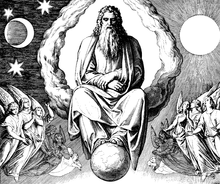
Back أصل الكون في الأديان Arabic Kosmologi (religion) Danish Kosmoloogia (religioon) Estonian کیهانشناسی دینی Persian Kosmologia uskonnoissa Finnish Cosmologie religieuse French Kosmologi agama ID Cosmologia religiosa Italian Kosmologiniai mitai Lithuanian Kosmologia religijna Polish

Religious cosmology is an explanation of the origin, evolution, and eventual fate of the universe from a religious perspective. This may include beliefs on origin in the form of a creation myth, subsequent evolution, current organizational form and nature, and eventual fate or destiny. There are various traditions in religion or religious mythology asserting how and why everything is the way it is and the significance of it all. Religious cosmologies describe the spatial lay-out of the universe in terms of the world in which people typically dwell as well as other dimensions, such as the seven dimensions of religion; these are ritual, experiential and emotional, narrative and mythical, doctrinal, ethical, social, and material.[1]
Religious mythologies may include descriptions of an act or process of creation by a creator deity or a larger pantheon of deities, explanations of the transformation of chaos into order, or the assertion that existence is a matter of endless cyclical transformations. Religious cosmology differs from a strictly scientific cosmology informed by contemporary astronomy, physics, and similar fields, and may differ in conceptualizations of the world's physical structure and place in the universe, its creation, and forecasts or predictions on its future.
The scope of religious cosmology is more inclusive than a strictly scientific cosmology (physical cosmology and quantum cosmology) in that religious cosmology is not limited to experiential observation, testing of hypotheses, and proposals of theories; for example, religious cosmology may explain why everything is the way it is or seems to be the way it is and prescribing what humans should do in context. Variations in religious cosmology include Zoroastrian cosmology, those such as from India Buddhism, Hindu, and Jain; the religious beliefs of China, Chinese Buddhism, Taoism and Confucianism, Japan's Shintoisim and the beliefs of the Abrahamic faiths, such as Judaism, Christianity, and Islam. Religious cosmologies have often developed into the formal logics of metaphysical systems, such as Platonism, Neoplatonism, Gnosticism, Taoism, Kabbalah, Wuxing or the great chain of being.